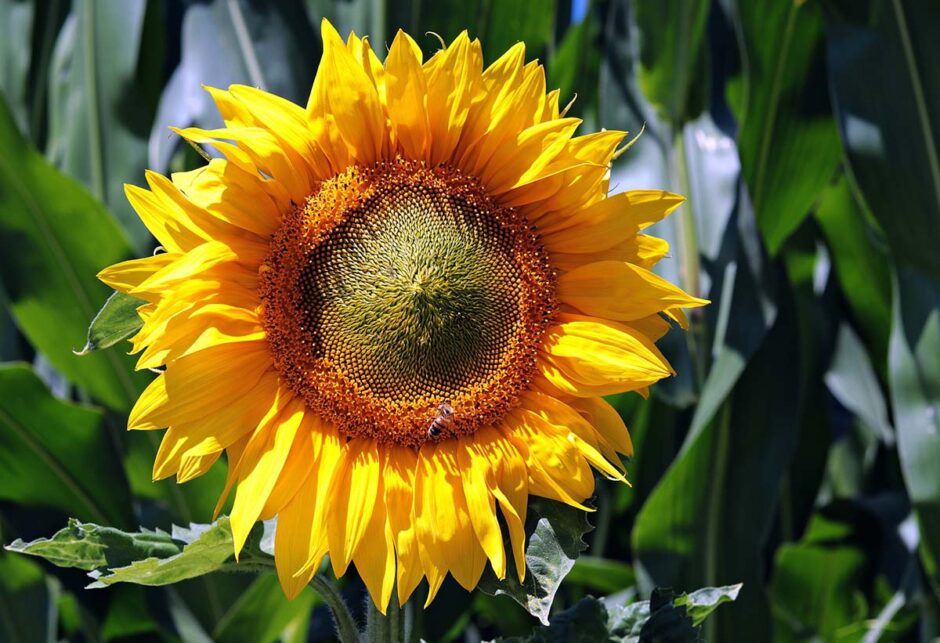One of the most well-known and adored plants in the world, sunflowers are distinguished by their towering size and cheery yellow blooms. You might be wondering how to begin cultivating these lovely blooms in your garden if you live in the UK.
We’ll go over the fundamentals of caring for and growing sunflowers in this guide and give you all the details you need to get started.

Growing Sunflowers: A Complete UK Guide
Introductions
Growing sunflowers is a rewarding and enjoyable activity that can bring vibrant color to your garden. This guide will walk you through everything you need to know about growing sunflowers successfully in the UK climate, from seed selection to care and maintenance.
Choosing the Right Seeds for Growing Sunflowers
The first step in growing sunflowers is carefully selecting the proper seeds. Sunflowers come in a wide range of varieties, each with unique characteristics and growth patterns. Consider the following when selecting seeds for the best sunflower varieties:
Height: Sunflower heights can range from a few feet to well over 10 feet, so consider your garden space.
Bloom time: Choose varieties that will bloom when desired, as different types flower at various times during the growing season.
Flower size: Some sunflowers have small blooms suitable for low borders, while others might have blooms over a foot across. Consider size when planning your approach to growing sunflowers.
Colours: Sunflowers come in various hues, including traditional yellow as well as orange, red, and even black. Select varieties that match your preferences and garden color scheme.
Once you’ve chosen the ideal sunflower variety, it’s time to prepare the soil for growing sunflowers.
Soil Preparation for Growing Sunflowers
Growing sunflowers requires proper soil preparation. While sunflowers are relatively easy to grow, they have specific soil requirements. The soil should be well-drained with a neutral pH between 6.0 and 7.0. If your soil is excessively acidic, add agricultural lime to raise the pH. If it’s too alkaline, add sulphur to lower it.
Sunflowers need abundant nutrients to grow robust and healthy. Before growing sunflowers, incorporate a slow-release fertilizer into the soil to ensure a consistent nutrient supply throughout the growing season.
I personally use fish blood and bone for most plants when growing sunflowers. This should be well-forked into the soil a couple of weeks before planting. Follow the instructions for correct quantities – overdoing it can result in plant death!
Planting Techniques for Growing Sunflowers
After preparing the soil, it’s time to plant your sunflowers. When growing sunflowers, you can either start them indoors in pots and then transplant them outside, or plant them directly in the ground.
When planting directly in the ground, select a location that receives at least six hours of direct sunlight daily. Place the sunflower seedling in a hole slightly larger than its root ball, then fill with soil.
For growing sunflowers from seed, each seed needs about a 10-cm gap between them. I recommend planting only two seeds in a single pot. Insert each seed about an inch deep in moist compost, then cover with more compost or a little vermiculite. Lightly water the seeds. As they grow, discard or repot any second seedling, keeping only the strongest one in each pot.
When to Plant When Growing Sunflowers in the UK
In the UK, sunflowers should be planted between late May and early June, spacing them about 18 to 24 inches apart. This allows your sunflowers ample time to develop and produce plenty of blooms before the first autumn frost kills them off in October-December.
Ideal Positioning for Growing Sunflowers
When growing sunflowers, choose a sunny area in your garden. For optimal growth, sunflowers require at least 6 hours of direct sunlight each day. If you live in a region that experiences extreme heat, consider planting your sunflowers where they receive some shade during the hottest part of the day.
Sunflowers aren’t particular about soil type as long as it drains well. Before growing sunflowers, loosen the soil and remove any weeds or debris. For dense soil, improve drainage by incorporating compost.
Caring for Your Growing Sunflowers
Although growing sunflowers requires relatively little care, there are a few things to keep in mind as they develop:
Watering: Sunflowers require consistent moisture, but not soggy conditions! Once or twice every week, give your plants a good soak, ensuring the soil around the roots gets thoroughly watered.
Feeding: To develop strong and healthy plants when growing sunflowers, apply a slow-release fertilizer once a month during the growing season.
Staking: Some taller sunflower varieties may need staking to prevent them from toppling over in heavy winds.
Pest control: While growing sunflowers isn’t typically plagued by pests and diseases, monitor for potential problems and treat any issues immediately to prevent spreading.
Supporting Your Growing Sunflowers
As your sunflowers grow, they may need additional support. Sunflowers can reach impressive heights, and the weight of the flowers may cause stems to bow or break. When growing near walls or fences, they can lean against these structures for support, or you can stake them to keep them upright.
Maintenance Tips
Deadhead your sunflowers regularly to encourage continuous blooming throughout the season. This involves removing spent blooms from the plant.
Conclusion
Growing sunflowers is a simple and enjoyable activity that the whole family can participate in, adding a splash of color to your garden. With proper care and attention, you can quickly have stunning sunflowers adorning your outdoor space. Why not give growing sunflowers a try today?
Sunflowers FAQs
When is the best time to plant sunflowers in the UK?
In the UK, late May to early June is the ideal time to sow sunflower seeds. This provides them with adequate time to develop before the first Autumn frost.
How much sunlight do sunflowers need to grow?
For optimal growth, sunflowers require at least 6 hours of direct sunlight. Choose a location that receives some shade during the warmest portion of the day if you live in a hot region.
What type of soil is best for growing sunflowers?
Sunflowers don’t have particular soil preferences; they can grow in a wide range of soil types as long as they have good drainage. If your soil is heavy, think about incorporating some compost or manure to enhance drainage.
How far apart should I plant my sunflower seeds?
Make sure to allow your sunflowers ample room to grow by planting them about 18 to 24 inches apart.
How often should I water my sunflowers?
Keep in mind that sunflowers require a steady supply of water to grow and bloom, so make sure the soil is regularly moist but not soggy.
Varieties of Sunflowers to try
- Dwarf Sunspot
- Dwarf Yellow Spray
- Giant Sungold
- Russian Sunflower
- Dwarf Moulin Rouge
- Teddy Bear
- Dwarf Italian White
- Autumn Beauty
- Dwarf Sundance
- Dwarf Sunset
- Autumn Time
In conclusion, cultivating sunflowers is enjoyable for any gardener of any age. You’ll be well on your way to creating a lovely and abundant display with a little care and attention. Sunflowers are an easy-to-grow and low-maintenance plant choice that is sure to make your gardening experience more rewarding. Why then wait? Start planting sunflowers right away!
Here is an article on the RHS website on this topic. If you are looking to grow flowers for the first time, here is an article I wrote on easy-to-grow flowers.



